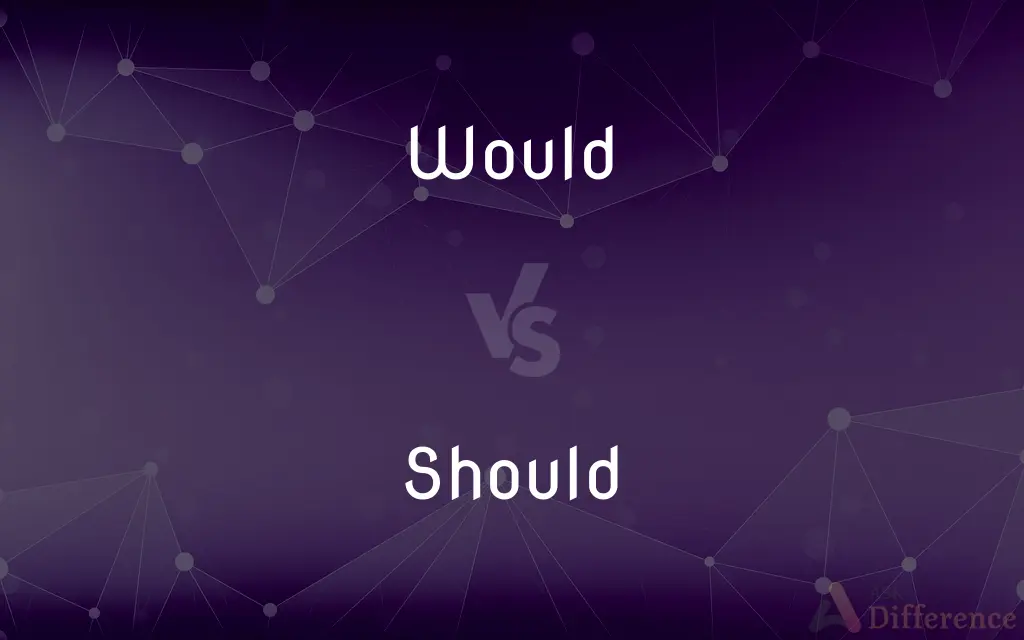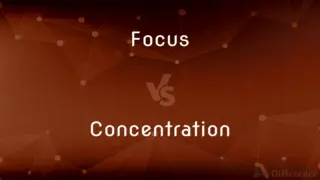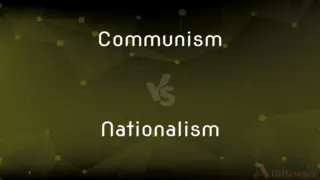Would vs. Should — What's the Difference?
By Maham Liaqat & Fiza Rafique — Updated on May 14, 2024
"Would" is used for hypotheticals and intentions, while "should" indicates obligation or advisability.

Difference Between Would and Should
Table of Contents
ADVERTISEMENT
Key Differences
"Would" often expresses hypothetical situations, such as conditional outcomes or imagined scenarios, while "should" is typically used to recommend actions or to express what is considered right or advisable.
In terms of grammar, "would" is the past tense of "will," indicating future-in-the-past scenarios, whereas "should" is the past tense of "shall," used for giving advice or making recommendations.
"Would" can be used to politely express a desire or inclination, softening requests or offers, while "should" suggests a duty or an expectation to perform a certain action.
When expressing regret or criticism, "would" might be used in the form of "would have" to talk about past possibilities that did not happen, on the other hand, "should have" is used to indicate a mistake or a missed obligation in the past.
In questions, "would" helps to form polite inquiries or hypothetical possibilities, while "should" often seeks advice or a decision on the correct course of action.
ADVERTISEMENT
Comparison Chart
Usage
Hypotheticals, polite requests, and wishes.
Advice, obligations, and recommendations.
Example Sentence
Would you help me with this?
You should see a doctor.
Grammatical Form
Past tense of "will."
Past tense of "shall."
Common Expressions
Would have liked to…
Should have done…
Tone and Implication
Indicative of possibility or wish.
Suggests necessity or correctness.
Compare with Definitions
Would
Indicates a polite request.
Would you mind closing the door?
Should
Suggests advisability.
You should check the weather before you go hiking.
Would
Expresses conditional action.
I would travel more if I had more time.
Should
Used to give advice.
You should start working on the project early.
Would
Describes a habitual action in the past.
Every summer we would visit the beach.
Should
Reflects the correct or best choice.
You should focus more on your health.
Would
Expresses a wish or desire.
I would like to order dessert now.
Should
(auxiliary) Ought to; indicating opinion, advice, or instruction, about what is required or desirable.
Would
Past of will, in various senses
The windows would not close
He said he would be away for a couple of days
She wouldn't leave
Should
Used to issue an instruction (traditionally seen as carrying less force of authority than alternatives such as 'shall' or 'must').
You should never drink and drive.
The law is clear that you should always wear a seat belt.
The manual says that this switch should be in the 'off' position.
Would
(expressing the conditional mood) indicating the consequence of an imagined event or situation
He would lose his job if he were identified
Should
Used to give advice or opinion that an action is, or would have been, beneficial or desirable.
You should go and see that film. I think you'll enjoy it.
I should exercise more often, but I’m too lazy.
She should not have been so rude.
Would
Expressing a desire or inclination
I would love to work in America
Would you like some water?
Should
(informal) With verbs such as 'see' or 'hear', usually in the second person, used to point out something remarkable in either a good or bad way.
You should see his new apartment. It's like a palace!
If you think her piano playing is bad, you should hear her sing!
Would
Expressing a polite request
Would you pour the wine, please?
Should
In questions, asks what is correct, proper, desirable, etc.
What do you think? What should I do?
Would
Expressing a conjecture, opinion, or hope
I would imagine that they're home by now
I guess some people would consider it brutal
I would have to agree
Should
(auxiliary) Ought to; expressing expectation.
Would
Used to make a comment about behaviour that is typical
They would say that, wouldn't they?
Should
Indicates that something is expected to have happened or to be the case now.
They should have finished by now; I'll call them to check.
My fruit trees should be in flower, but the cold spring has set them back.
Would
Expressing a wish or regret
Would that he had lived to finish it
Should
Will be likely to (become or do something); indicates a degree of possibility or probability that the stated thing will happen or be true in the future.
They should have it finished by Friday.
When you press this button, the pilot flame should ignite.
You should be warm enough with that coat.
Would
Past tense of will; usually followed by a bare infinitive.
Should
Used to form a variant of the present subjunctive, expressing a state or action that is hypothetical, potential, mandated, etc.
If I should be late, go without me.
Should you need extra blankets, you will find them in the closet.
The man demanded that he should be allowed entry.
I'm surprised that he should say that.
Would
Used to form the "anterior future", or "future in the past", indicating a futurity relative to a past time.
On my first day at University, I met the woman who would become my wife.
Should
(auxiliary) cap=1.
I told him that I should be busy tomorrow.
Would
Used to; was or were habitually accustomed to; indicating an action in the past that happened repeatedly or commonly.
When we were younger, we would cycle out to the beach most summer Sundays.
Should
(auxiliary) An alternative to would with first person subjects.
Would
Was or were determined to; indicating someone's insistence upon doing something.
I asked her to stay in with me, but she would go out.
Should
Used to express a conditional outcome.
If I had not been so tired, I should have laughed heartily.
Would
Could naturally have been expected to (given the tendencies of someone's character etc.).
He denied it, but then he would, wouldn't he?
Should
Used to impart a tentative, conjectural or polite nuance.
I should imagine that they have arrived by now.
I should think you would apologize.
Would
(archaic) Wanted to.
Should
Used to express what the speaker would do in another person's situation, as a means of giving a suggestion or recommendation.
It's disgraceful the way that they've treated you. I should write and complain.
Would
(archaic) Used with ellipsis of the infinitive verb, or postponement to a relative clause, in various senses.
Should
To make a statement of what ought to be true, as opposed to reality. en
Would
(obsolete) Wished, desired (something).
Should
Something that ought to be the case as opposed to already being the case.
Would
A modal verb, the subjunctive of will; usually followed by a bare infinitive.
Should
Used as an auxiliary verb, to express a conditional or contingent act or state, or as a supposition of an actual fact; also, to express moral obligation (see Shall); e. g.: they should have come last week; if I should go; I should think you could go.
Would
Used as the auxiliary of the simple conditional modality, indicating a state or action that is conditional on another.
If I won the lottery, I would give half the money to charity.
Should
Indicates obligation or duty.
You should wear a seatbelt while driving.
Would
Without explicit condition, or with loose or vague implied condition, indicating a hypothetical or imagined state or action.
I would love to come and visit.
Look at that yummy cake! I would eat that all up!
Should
Expresses expectation.
They should arrive by noon.
Would
Suggesting conditionality or potentiality in order to express a sense of politeness, tentativeness, indirectness, hesitancy, uncertainty, etc.
I would ask you all to sit down.
I would imagine that they have already left.
Would
Used to express what the speaker would do in another person's situation, as a means of giving a suggestion or recommendation.
It's disgraceful the way that they've treated you. I would write and complain.
Would
Used to express the speaker's belief or assumption.
He's very security-conscious, so he would have remembered to lock the door.
They would be arriving in London round about now.
Would
Used interrogatively to express a polite request; are (you) willing to …?
Would you pass the salt, please?
Would
Might wish (+ verb in past subjunctive); often used in the first person (with or without that) in the sense of "if only".
Would
Might desire; wish (something).
Would
Something that would happen, or would be the case, under different circumstances; a potentiality.
Would
Commonly used as an auxiliary verb, either in the past tense or in the conditional or optative present. See 2d & 3d Will.
Right as our Lord hath would.
Would
See 2d Weld.
Would
Used in reported speech.
He said he would finish the work by Monday.
Common Curiosities
What is the main use of "would"?
"Would" is primarily used for expressing hypothetical situations and polite requests.
Is "would" used for past actions?
"Would" can describe habitual past actions or future-in-the-past scenarios.
Can "would" be used to make polite requests?
Yes, "would" is often used to make requests more polite.
Can "would" and "should" be used interchangeably?
No, "would" and "should" serve different grammatical and contextual purposes and are not interchangeable.
How does "would" express willingness?
"Would" can express willingness or consent in response to suggestions.
What does "should" suggest in advice?
In advice, "should" suggests what is advisable or recommended.
Why use "should" in suggestions?
"Should" is used in suggestions to imply what is considered the best or correct action.
What does "should have" imply?
"Should have" implies a missed obligation or an error in the past.
Is "should" ever used in questions?
Yes, "should" is often used in questions seeking advice or an opinion on a proper course of action.
How is "should" commonly used?
"Should" is used to indicate advice, obligations, or recommendations.
Does "would" have a future aspect?
Yes, "would" can have a future aspect when discussing hypothetical future situations.
What is a typical scenario for using "should"?
Typical scenarios include giving advice or expressing what is expected.
Share Your Discovery

Previous Comparison
Focus vs. Concentration
Next Comparison
Communism vs. NationalismAuthor Spotlight
Written by
Maham LiaqatCo-written by
Fiza RafiqueFiza Rafique is a skilled content writer at AskDifference.com, where she meticulously refines and enhances written pieces. Drawing from her vast editorial expertise, Fiza ensures clarity, accuracy, and precision in every article. Passionate about language, she continually seeks to elevate the quality of content for readers worldwide.
















































